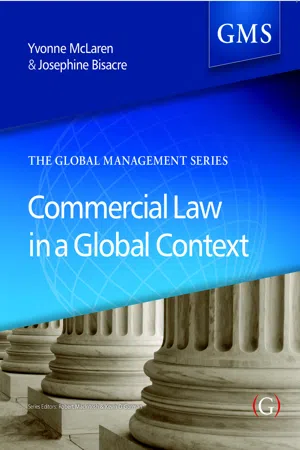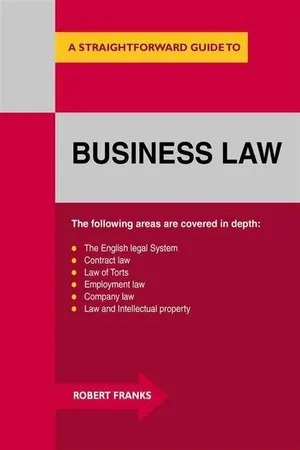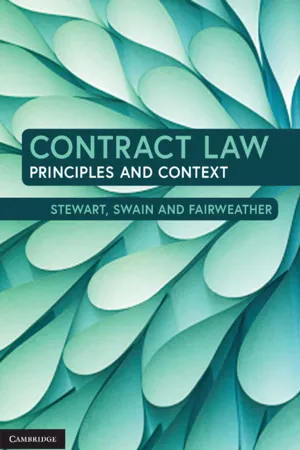Law
Contractual Obligations
Contractual obligations refer to the duties and responsibilities that parties agree to fulfill when entering into a contract. These obligations are legally binding and may include payment, delivery of goods or services, or specific performance of certain actions. Breaching contractual obligations can lead to legal consequences, such as financial penalties or court-ordered enforcement of the contract.
Written by Perlego with AI-assistance
Related key terms
1 of 5
6 Key excerpts on "Contractual Obligations"
- eBook - PDF
- Yvonne McLaren, Josephine Bisacre, Yvonne McLaren, Josephine Bisacre(Authors)
- 2016(Publication Date)
- Goodfellow Publishers(Publisher)
5 The Law of Obligations Yvonne McLaren On a day to day basis we are likely to engage in a variety of contractual situations whether we are aware of it or not. Think of a regular routine of stopping at the coffee shop to buy our coffee and cake for our daily treat. In a legal sense this might be defined as a consumer contract with all the corresponding rights and obligations, i.e. our right to have the products as requested, free from defect or issue, and the obligation of the seller to provide our requests. Further we have an obligation to pay for the products and the seller has a right to receive remuneration for the product given. Effectively this example provides us with an introduction to the law of contract. In the next six chapters, we will be exploring the law of obligations. As will be seen, these range from voluntary obligations we choose to enter, to obligations we owe to our fellow citizens whether we like it or not (involun -tary obligations). This chapter starts with an overview of legal obligations in general and then introduces the law of contract. What is a legal obligation? Effectively we can say that there is a distinction between: a legal ‘duty’ – owed to everybody and a legal ‘obligation’ – owed to a specific person. So for example, you owe a duty to take reasonable care not to injure people. If you do injure someone, you may have an obligation to compensate him or her. Historically, the Scots law of obligations came from principles of Roman law, although the increased influence of English law since the 18th century means that the law in the two countries is now very similar, but please note, not identical. Commercial Law in a Global Context 66 During the study of contract law, the emphasis for students is to provide authority for conclusions and assertions made. The main principles of the law of obligations have been set down and developed by judicial decisions (common law), rather than enacted by Parliament (statute law or legislation). - eBook - ePub
- Thomas Glyn Watkin(Author)
- 2018(Publication Date)
- Routledge(Publisher)
14 Contractual Obligations1 Introduction
Contractual Obligations are those which arise through the agreement of the parties to the obligation. This gives rise immediately to the question of whether every agreement made gives rise to a contractual obligation. Putting aside for the moment the capacity of the parties to enter into contractual relations, the question turns upon whether the law is prepared to recognize and enforce any sort of agreement. Certain agreements will not be recognized by the law because they are unlawful, contrary to public morals or the public interest. However, even if there is no such definite reason for refusing to recognize their validity, the law does not necessarily enforce every agreement which is lawful. Some agreements or promises are too trivial for the law to enforce, and sometimes the parties do not require the intervention of the law.English law has traditionally only enforced two types of agreement: firstly, those made formally in writing in a deed, which unti! very recently had also to be under seal; secondly, the agreement that is made for consideration. The latter type of agreement is by far the more common and it is often said that the common law doctrine of consideration was devised in order to distinguish those contracts which deserved the protection of the law from those which did not. An agreement which lacks consideration is a bare agreement, a nude pact, and English law borrows the maxim of the civil law to describe its attitude to such agreements: ex nudo pacto non oritur actio ; an action does not arise out of a bare pact.The maxim ex nudo pacto non oritur actio was devised by the lawyers of ancient Rome to emphasize that simple pacts or agreements would not give rise to legal actions, and the maxim is as influential in civil law systems today as it is in the modern common law of contract. In the last chapter, the example was considered of A requesting the loan of B's lawnmower and Β agreeing to lend it. That agreement, that Β lend A his lawnmower, did not give rise to a legally enforceable contractual obligation. The agreement alone was not enough; it was at that stage a bare pact which did not give rise to an action. However, when Β actually handed over the lawnmower to A, an obligation arose and an action was thenceforward available for its enforcement. The agreement ceased to be a bare pact with the handing over of the thing, the res which was the subject-matter of the contract. Because the agreement had until that moment been a bare pact, nudum pactum, and from that moment on gave rise to an action and was therefore no longer a bare pact, the mediaeval jurists spoke of the handing over of the thing as clothing the agreement. Agreements, they maintained, to be actionable must not be bare but clothed, and they developed this literary conceit further, by describing the various factors which operated to make agreements actionable as the vestments which clothed them. Naked agreements could not decently be entertained in the courts. Accordingly, the parties must clothe them with a suitable vestment for them to be admitted. One way of clothing an agreement was by handing over the thing which constituted its subject-matter, in which case the agreement was said to be clothed with or by the thing, re. Such agreements which were clothed re, - eBook - ePub
Introduction to Spanish Private Law
Facing the Social and Economic Challenges
- Teresa Rodriguez de las Heras Ballell(Author)
- 2009(Publication Date)
- Routledge-Cavendish(Publisher)
The stylization of the concept of obligation probably has an historical rationale behind it. In classical Roman Law most of the obligations were created by a stipulatio or an exchange thereof. Therefore, Obligations Law and Contract Law are to be assembled in a compact mechanism ready for grappling with legal aspects of economic transactions. From a terminological perspective, the use of the word ‘obligation’ is turning into the spread of the all-embracing expression of ‘obligatory relationship’ (relación obligatoria) describing the whole relationship between the parties aimed to achieve assigned economic purposes and fulfil parties’ interests. 1. Obligations 1.1. Key concepts A clear and direct definition of obligation is not provided by the Civil Code. Taking the concept for granted, Article 1088 simply states that obligations may consist of giving, doing or not doing something. Hence, to gain an insight into the concept of obligation, the sense attributed by the spontaneous language and the terminology used by the Civil Code itself might be an initial useful guideline. A first understanding identifies obligation with legal duty. But soon a finer precision of concepts leads to duly distinguishing the foregoing concepts and overcoming the previous simple identification. More exactly, obligation embodies a legal state where a person (the creditor) holds the power to require another person (the debtor) to carry out or refrain from carrying out an act. Accordingly, an obligation is not only a legal duty imposed on the debtor but also a power or a right-hold by the creditor. The binomials duty—right and power—debt illustrate the essence of obligation from a technical perspective. Likewise, every obligation embraces two separate phenomena: debt (debitum in Latin and in German described as Schuld) and liability (obligatio in Latin and in German, Haftung) - eBook - ePub
Business Law
A Straightforward Guide
- (Author)
- 2014(Publication Date)
- Straightforward Publishing Digital(Publisher)
Ch. 1
BUSINESS LAW-THE LAW OF CONTRACT
Underpinning all contracts are four main principles:
1) A contract is an agreement between the parties to that contract-one person makes an offer and the other accepts that offer 2) Both parties have an intention to be legally bound by the agreement-this is usually known as an intention to create legal relations3) Parties to the agreement need to be absolutely clear as to the terms of the agreement – this is the main area of contention with contracts, as we will see laterc4) There must be consideration provided by each of the parties to the contract – this means that one person promises to give or deliver and the other promises to pay. The offer and the payment – either monetary or in kind - is the consideration. When making a contract, or entering into a contract all parties to the contract must have the legal capacity to enter into a contract. Very importantly, a contract, in most cases, does not have to be in writing – a piece of paper is not necessary, the agreement and evidence of that agreement forms the basis of contract. There are a few important exceptions, including contracts relating to interests in land (Law of property (Miscellaneous Provisions) Act 1989, s 2(1)) and consumer credit (Consumer Credit Act 1974).Other factors affecting formation include: • Form-the way the contract is created (e.g. the sale of land can only be made in the form of a deed) Form is an issue with specialty contracts but not with simple contracts• Privity of contract and the rights of third parties-generally a contract is only enforceable by or against a party to it, subject to exceptions and certain third party rights are now protected in the Contracts (Rights of Third Parties) Act 1999.The nature of contracts – unilateral and bilateral contracts
The majority of contracts entered into are known as Bilateral contracts. This quite simply means that each party to a contract agrees to take on an obligation. This obligation is underpinned by a promise to give something to the other party. A Unilateral contract will arise where one party to the contract will make a promise to do something (usually to pay a sum of money) if the other party carries out a certain task. Examples of this are where you might undertake to pay someone a sum of money if they shave off their hair for charity or give up smoking. Estate agents enter into unilateral contracts whereby a percentage of sales go to the agent if they sell the property. However, the agent is not legally bound to sell the property, just to try to sell it. - eBook - PDF
Obligations
Law and Language
- Martin Hogg(Author)
- 2017(Publication Date)
- Cambridge University Press(Publisher)
When one man has a peculiar right (i.e., not a merely public right, or a right incident to ownership or a permanent family relation) to control another man’s actions by calling upon him to do or to forbear some particular thing, there is said to be an obligation between them . . . The person whose action is thus controlled is said to be obliged or bound. A contract accordingly is an agreement which produces an obligation. 74 We see in this passage a grudging acceptance of an analysis of a contract as giving rise to an ‘obligation’ (conceived of in Roman terms) between the parties to it. For Pollock, this is (somewhat curiously) an analysis ‘adopted’ by English law, but one which ‘cannot strictly be called part of it’, a description which leaves it entirely unclear as to whether such an analysis is or is not appropriate. Pollock swiftly follows up the Civilian analysis of the above passage with a more familiar characterisation of the party under the contractual obligation as having made a promise, but returns to the language of obligation at a number of later points in his text. 75 In addition to Pollock’s acknowledgment of the Civilian sense of obligation as a bond, creating rights and reciprocal duties, arising out of certain sorts of relationship, he also uses obligation as a synonym for duty, referring at various places to ‘contractual obligation’ in the sense of 73 See pp. 6–8. 74 P. 5. 75 He opens Chapter 5 with the statement that ‘[t]he original and simplest type of contract is an agreement creating an obligation between certain persons’ (p. 166), and he continues (p. 167) by stating that a ‘contract creates an obligation between the contracting parties, consisting of duties on the one part and the right to demand the performance of them on the other’. Significantly, he entitles Chapter 12 ‘Agreements of Imperfect Obligation’, by which he means things such as time-barred obligations and obligations not in the proper form. e obligation 39 - eBook - PDF
Contract Law
Principles and Context
- Andrew Stewart, Warren Swain, Karen Fairweather(Authors)
- 2019(Publication Date)
- Cambridge University Press(Publisher)
But see Carter et al 2015: 211–15, strenuously objecting to the very concept. III 174 PART III: Contractual Obligations obligation some Australian judges at least have been prepared to identify: see 12.19–12.23. But more usually, a term is recognised as being a legal incident of a particular class of contract. Almost all common types of contract have attracted some form of standard implication. Here, for instance, is a list compiled by Williams (1945: 403) and cited in Byrne at 448: Examples of such terms ‘implied’ into contracts by rules of law are the implied conditions of reasonable fitness and merchantable quality on a contract of sale of goods, the rule that payment and delivery of goods are concurrent conditions, the implied warranty of seaworthiness [for ships], the implied condition on the letting of a furnished house that it is reasonably fit for habitation, the implied promise by one who agrees to build a house that the house will be reasonably fit for habitation, the implied promise by a servant not to disclose secret processes, not to hand over to a rival written work completed for the master, and not, while still in his [sic] master’s employment, to solicit the master’s customers to transfer their custom to himself, the implied promise by an employer (in some cases) to furnish work, the implied duty of care in the carriage of passengers and in looking after bailed goods, and the implied promise by a banker not to disclose the state of his customer’s account. A number of these established terms are now enshrined in legislation, along with many others. As discussed later in the chapter, they are given effect either as terms implied by statute or, as with the ACL’s consumer guarantees, as statutory obligations. But there are some types of contract for which the common law implied terms retain their importance.
Index pages curate the most relevant extracts from our library of academic textbooks. They’ve been created using an in-house natural language model (NLM), each adding context and meaning to key research topics.





